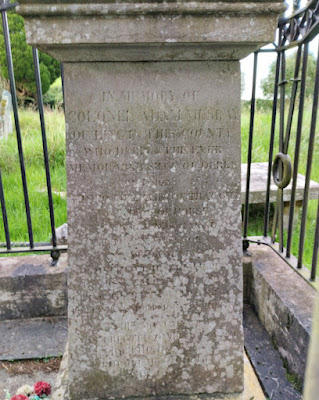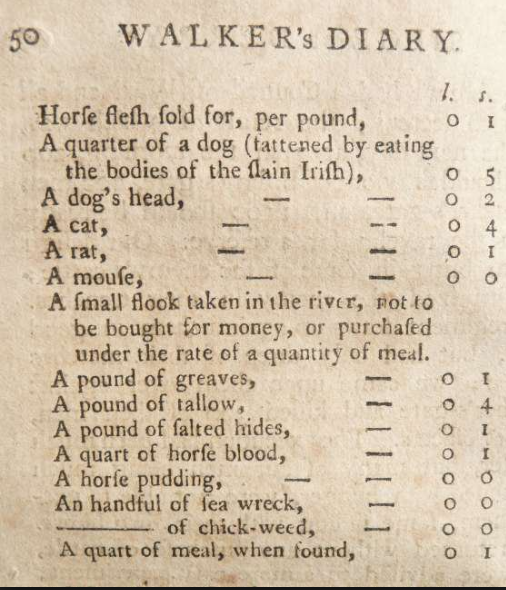The siege of Derry - myths and genealogy. The case against Gideon Murray.
Siege Myths and genealogy
Colonel Adam Murray served as commander of the Williamite cavalry during the Siege, having raised a troop of 30 Horsemen for the city's defence. He was a key figure in the battles of Pennyburn (where he killed the French General Maumont in a sword fight) and Windmill Hill. Some siege accounts relate that the Jacobites captured Murray's elderly father, Gideon Murray and threatened to hang him unless the city surrendered. Apparently, Gideon Murray encouraged the defenders to continue fighting and to never surrender. Old Gideon Murray was spared by the Jacobites but died circa 1690.
A Genealogical and Heraldic Dictionary of the Landed Gentry of G.B & Ireland, (1863), volume 2 page 1058 by Bernard Burke states that Gideon Murray went to Ireland c1648 and settled at Ling in Cumber parish in Co. Derry. Murray reputedly held considerable interest in the lands granted to the Skinners company, the lease of which passed from the family about 1805. By his marriage with Miss Mackey, a Scotch lady, Gideon Murray had issue Adam, afterwards Col Murray who so distinguished himself during the siege of Derry.
The search for Gideon Murray
Despite an extensive search of seventeenth century records I was unable to discover any primary source of information on Gideon Murray. His name does not appear on any of the extant muster rolls nor in the Subsidy rolls of 1662 or the hearth money rolls of 1663. Nor does his name appear in any registered deed or in estate records, nor any plantation papers or church records.
I am very doubtful of the existence of Gideon Murray. The lack of records does not necessarily mean that he did not exist, nevertheless it seems that the family tree has been based on speculation rather than any documentary evidence. In effect Bernard Burke was relying on secondary information to conclusively state the origins of Col Adam Murray's family.
It is also dubious because name patterns were very strong in seventeenth and eighteenth century Ireland. Adam Murray named his son James Murray and none of his descendants used the Christian name Gideon, which betrays the traditional naming patterns of families in that era.
In the the protestant householder's survey of Cumber 1740 we find a John Murray in Ling and a James Murray in Gosheden. The latter may have been Adam Murray's son who married Anne Patterson (daughter of Thomas Patterson, the provost of Strabane). The 1663 hearth returns reveal a Phelemy O'Murrey and an Edmund O'Murrey resident in Slaughtmanus townland in the parish but they were native Irish. No reference to a Gideon Murray. If Murray was a proprietor of a large estate, as claimed then one would have expected him to have made a will but none appears to have been probated in the Derry Diocesan court nor in the prerogative court (indexes of these have survived and no Gideon Murray appears). Derry Corporation records seem to confirm the connection to the townland of Ling in Cumber as an Adam Murray of Ling was registered as a freeman of the city in 1797 (Council minutes 30 Dec 1797) and also with him a James Murray of Hingham in Norfolk (that they were listed next to each other may be significant).
The family burying site has traditionally been Old Glendermott where Col Murray and his descendants are commemorated in the old graveyard.
In Memory of Colonel ADAM MURRAY of Ling in this | county/who during the ever memorable siege of Derry | A.D. 1688 led to the relief of that City a troop of horse | which he had raised for its defence and who eminently | distinguished himself by his skill and bravery during that | eventful struggle for civil and religious liberty This | monument was erected over his grave by The | Honourable The Irish Society A.D. 1837.
 |
| Grave of Adam Murray |
The hearth money returns for Glendermott parish reveal an Adam Murrey (sic) residing in Prehen townland. Whether this is the Adam Murray of siege fame is not known but it is possible. An Adam Murray was an elder of the Presbyterian Church of Glendermott (united at the time with Faughanvale and Cumber) in 1674 - he was a delegate sent to a meeting of the Laggan Presbytery held in Ray, Co Donegal in that year. This was possibly the Adam Murray noted in Derry Corporation minutes as deceased in February 1690 with arrears of £11, 6sh .
It is possible that there is primary evidence somewhere that proves that Gideon Murray settled in Cumber but it is equally possible that the oral history is incorrect and that Gideon Murray is in fact a mythical figure.



Was Ballykelly or Tartnakelly ever known as Little Dublin ? I saw this used on a very old death cert.
ReplyDeleteThis is a comment to the principal story (in case it appears to be about Little Dublin). I am with the Murray DNA Project and have evidence that I am related to the William Murray said to be a brother of John Murray of Swatara Creek, Pennsylvania who died in 1744 in Colonial America. John had a "brother" Thomas Oates who may be been the one married to Anne Murray suspected https://www.wikitree.com/wiki/Oates-275 of being a daughter of Samuel Murray and a niece of Col. Adam Murray. I can see that the mysteries of Murray genealogy started in Europe not the Americas. Y-DNA is needed; there is no know living Y-DNA of John's line nor mine, but dead Y-DNA might get accessed. There is tested, living Y-DNA of line of William said by Dr. Egle's book to be a brother of John who someone in a provenly closely related Y-DNA lines thinks might have been a 1st cousin.
ReplyDelete